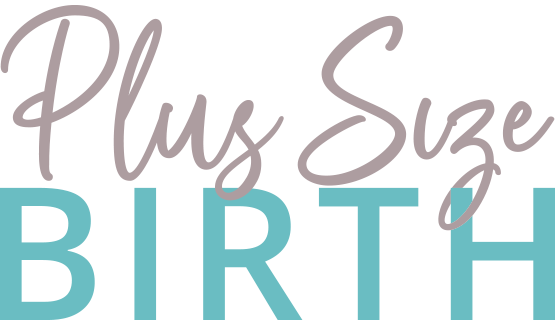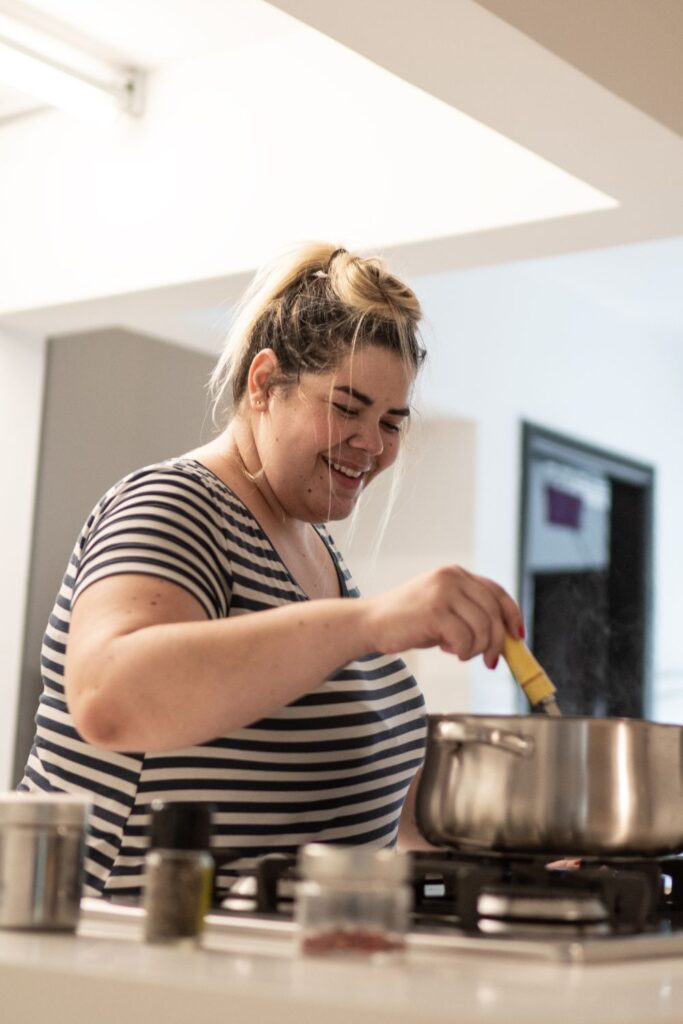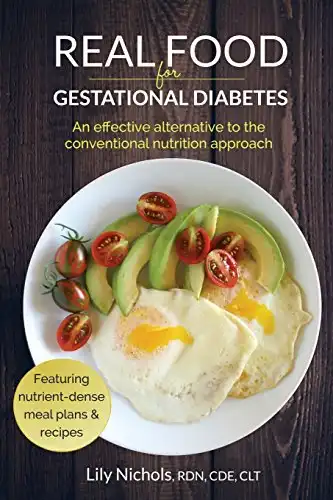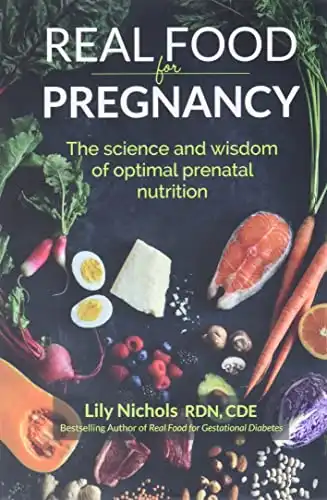Lily Nichols is a registered dietitian, diabetes educator, and researcher with expertise in prenatal nutrition and gestational diabetes. She shares gestational diabetes nutrition tips for plus size women.
The internet leads us to believe that having a plus size pregnancy goes hand-in-hand with gestational diabetes.
The reality is that people of all sizes incur gestational diabetes!
If you get diagnosed with gestational diabetes (GD) please know that your body is not broken and you didn't do anything wrong.
And we're here to help with next steps following a gestational diabetes diagnosis!
Beating yourself up or becoming stressed out sure doesn't help anything.
You have every right to throw a pity party.
But then it's time to become super proactive with your health and the health of your baby!
Disclosure: Plus Size Birth is a participant in the Amazon Services LLC Associates Program, an affiliate advertising program. As an Amazon Associate, I earn from qualifying purchases. Read more about these links in my disclosure policy.
Gestational Diabetes Nutrition
When it comes to nutrition during pregnancy, do you have any special advice for plus size women?
To be honest, the nutrition advice I give for pregnant women is pretty similar regardless of their size.
Eating a nutrient-dense!
Real food diet helps provide your baby with the nutrients needed to develop properly. And it has the side-benefit of helping keep your weight gain at a healthy level.
There’s some research showing plus size women are at higher risks during pregnancy.
All of these can be minimized by eating foods that naturally keep your blood sugar balanced.
When your blood sugar doesn’t spike and plummet frequently, you have fewer cravings for sugary and starchy snacks.
Your blood pressure is less likely to go too high (since your blood pressure is directly affected by your blood sugar).
And your baby is more likely to grow at a normal rate (since blood sugar is a major driver of your baby’s weight gain, especially in the last trimester).
Would you recommend that people follow a gestational diabetes nutrition tips regardless if they have GD or not?
Essentially, yes. I recommend a moderately low-carb, real food diet based primarily on fresh vegetables, meat, fish/seafood, eggs, dairy, nuts, seeds, legumes, and a little fruit.
I encourage moms to eat mindfully. Following hunger and fullness cues for how much and when to eat – rather than count calories or obsess over numbers.
For a mom with gestational diabetes, some level of tracking may be necessary to manage her blood sugar (like monitoring her carbohydrate intake). But it depends on the woman.
Eating fewer carbohydrates generally means women will eat less refined grains, junk foods, and added sugars. This leaves more room for nutrient-dense foods that provide a growing baby with essential nutrients.
Before you cut out all carbs, know that there are a variety of carbohydrate foods that pregnant women should continue to eat. This includes vegetables, fruit, nuts, seeds, and if they are OK on your digestion, dairy, and legumes.
Although I wrote my book for women with gestational diabetes, I know many midwives and doctors that suggest it to all of their moms to prevent complications (like gaining too much weight during pregnancy or iron-deficiency anemia) and ensure they are getting enough nutrients to promote optimal brain development.
Newer research is showing that even mildly elevated blood sugar levels (below the diagnostic threshold for gestational diabetes) can increase the risk of certain birth defects, including congenital heart defects, which is bringing a lot more attention to non-GD reasons to prioritize a lower-carb, real food way of eating.
For someone who has been diagnosed with GD, what are the first steps they should take right away?
First, is to take a deep breath and know everything is going to be ok.
Gestational diabetes is 100% manageable and often changing what you eat and how much/how often you move your body are all that’s needed.
Start by checking your blood sugar to understand where your levels are at and then learn about what foods are best to help prevent your blood sugar from spiking.
I have an in-depth 3-part video series (it’s FREE) on my website that walks you through the basics and includes a downloadable pdf guide on managing blood sugar, naturally, using my real food approach.
My book and online course of the same name, Real Food for Gestational Diabetes, are available if you need further guidance or support.
I believe that pregnancy is a wonderful opportunity, for many, to transform their relationship with food and develop new habits. What advice do you have for women during the postpartum period and beyond?
I completely agree.
There’s no better motivation than knowing that your baby is relying on you for nourishment. It’s important to realize that nourishing yourself and taking care of your body is pretty much the only part of pregnancy that’s within your control. It’s both humbling and empowering.
As a mom myself, I know how challenging the postpartum period is (the “4th trimester” is a perfect description).
I encourage moms to line up as much support to help with things like housework and meals, so they don’t have to try to do it all alone. It’s overwhelming and nearly impossible to get by without help.
Think of easy, but healthy, meals to have on hand – either ones that are prepped in the freezer when you’re too tired to cook or can be quickly thrown together (like freezing a pan of lasagna that uses zucchini for noodles or making a quick salad and topping it with a grass-fed beef burger patty and avocado).
Without pre-planning, a lot of moms fall into the habit of getting fast food or take out. There’s no shame in that. Sometimes it’s all about survival, but having grab-n-go healthy food helps make take-out the exception, not the rule. Here are some ideas that can be helpful: http://pilatesnutritionist.com/8-ways-to-make-cooking-easier-and-faster-than-takeout/
If you’re breastfeeding, you’ll be VERY hungry and it’s important to eat enough, so you can produce enough breastmilk. Try not to worry too much about losing the baby weight early on. It takes time for your body to adjust and that’s entirely normal and OK.
Listen to the Plus Mommy Podcast interview with Lily Nichols – Gestational Diabetes And Pregnancy Nutrition When You’re Plus Size
Lily Nichols is a real food-focused registered dietitian, diabetes educator, and researcher with expertise in prenatal nutrition and gestational diabetes. Her book, Real Food for Gestational Diabetes (and online course of the same name), is the first to advocate for a nutrient-dense, lower carb diet for managing gestational diabetes. Learn more: realfoodforgd.com
- Gestational Diabetes Diagnosis: What Now? A Helpful To-Do List! - October 18, 2023
- Navigating Miscarriage and Self-Blame as a Plus-Size Individual - October 16, 2023
- How much does your BMI increase the odds of shoulder dystocia? - August 11, 2023




